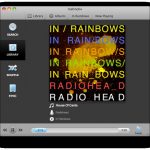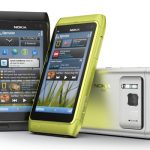Twitter finally releases its official Android app

It's been quite a week for Android apps. It started with the early release of two major browsers and has closed out with the release of the platform's first official Twitter app.
Until now, Android has been a battleground for third-party Twitter solutions with more than 20 major competitors jockeying to be the "most official" Twitter app for the platform.
Response to Jobs' remarks about Android porn: iPad 3G porn

Apple CEO Steve Jobs has made numerous disparaging remarks about Google's Android platform because of the availability of X-rated material on it, statements that obviously downplayed the ubiquity of pornography.
"You know, there's a porn store for Android," Jobs said. "You can download nothing but porn. You can download porn, your kids can download porn. That's a place we don't want to go -- so we're not going to go there."
New beta unshackles Mac users from iTunes' sync shortcomings

Windows users have a lot of alternatives to the "mainstream" media players (Windows Media Player and iTunes). However, Mac OS users are not so fortunate. Aside from a couple of minor exceptions, Mac OS is an iTunes-dominated platform.
And as such, it means support for portable media players that don't have an "i" at the beginning of their name is scarce.
Software update may turn all Kindle users into a cloud-based book club

Today, Amazon posted an overview of what Kindle owners can expect in its version 2.5 software update now slated for late May.
This will be the first major feature upgrade to Amazon's e-paper device line since the launch of the Kindle DX last year. After the launch of that model, there was a single software update, which moderately improved the user experience by stretching battery life and adding native .PDF support.
Ubuntu 10.04 LTS gives Linux even more mainstream appeal

Download Ubuntu 10.04 "Lucid Lynx" LTS from Fileforum now.
As expected, Canonical today released the latest long-term support version of Ubuntu (v. 10.04, a.k.a., "Lucid Lynx"). This release carries considerably more weight than the usual bi-annual Desktop and Server updates because long-term support (LTS) come only biennially -- once every two years. They typically don't get treated to experimental feature additions, and are meant to be more stable. They do, however, include three years of package support for Ubuntu Desktop and five years for Ubuntu server. The last LTS versions Canonical released were "Dapper Drake" (4.0) in 2005 and "Hardy Heron" (8.04) in 2008.
Yet another major browser hits Android as Skyfire 2.0 beta launches

Skyfire, the third party mobile browser famous for its ability to handle nearly every major browser plug-in and web technology has finally arrived in the Android Market today.
At the beginning of April, the browser was released in a very limited alpha program which received overwhelming interest from users. The Skyfire team said it had to stop taking email requests for the software almost immediately because of the sheer volume of messages. Well, those masses now have something they can sink their teeth into.
Steve Jobs: Why Flash sucks

Today, just as Adobe released a preview of Flash Player for Mac OS X that features H.264 video decoding, Apple CEO Steve Jobs released a letter called "Thoughts on Flash," which explains the many reasons why there's no Flash support on any of Apple's mobile devices, and why H.264 is a better format.
The letter is emblematic of Apple's increasingly verbal approach to the frantically interested but highly misunderstanding public: "Adobe has characterized our decision as being primarily business driven -- they say we want to protect our App Store -- but in reality it is based on technology issues. Adobe claims that we are a closed system, and that Flash is open, but in fact the opposite is true. Let me explain."
A gentle hands-on with Mozilla's first browser for Android

Android apps crash. There's no other way to say it. If you spend a lot of time installing and testing new apps on Android devices, you know it.
So when Mozilla officially rolled out its first public version of the Fennec mobile browser for Android with various warnings that it is a very early "pre-alpha," with experimental features that could require hard resets, I thought I knew what I was in for.
AOL's rebuilding effort continues, sells long-running IM service ICQ at a loss

Russian Internet investment firm Digital Sky Technologies will be acquiring ICQ from AOL Inc. for $187.5 million, the companies announced today.
Former Internet service provider AOL purchased ICQ creators Mirabilis Ltd. for $407 million in 1998. At the time, the free ICQ chat client was one of the most popular pieces of free software available.
Windows Embedded Standard 7 released, is it ready for TV yet?

First announced just two weeks after Windows Embedded Standard 2009 was released, Windows Embedded Standard 7 has at last been released to manufacturers, Microsoft announced today. The company says that new devices built on the platform should be arriving soon, and that we should expect to see some "exciting developments" in Windows 7 consumer devices at Computex in June.
Though Windows Embedded Standard 7 can be used in dozens of different environments such as digital signage, thin clients, and industrial control systems, Microsoft has emphasized the value of this version to connected set-top boxes, TVs, and media players.
Introducing the first Symbian^3 device, Nokia N8

The Symbian Foundation's 100% open source mobile operating system Symbian^3 has officially made its debut today on the new Nokia N8 handset.
Unlike Google's Android, which launched on a mid-range smartphone in late 2008, Symbian^3 is being ushered into the market on a device with cutting-edge equipment.
Marvell unveils 1 GHz chips that consume just 1 watt of power

Chipmaker Marvell today debuted a new processor in its Armada family, designed for plug computing, for home, small business and industrial automation, and applications demanding ultra low power consumption.
The Armada 310 system-on-a-chip is built with an ARMv5 processor between 500 MHz and 1 GHz that consumes less than 1 watt of power. Fixed on a 15 x 15mm FCBGA (Flip Chip Ball Grid Array), the Armada 310 offers tons of I/O options, such as two Gigabit Ethernet MACs, two SATA 2.0 ports, two PCIe ports, USB 2.0, and DDR2/3.
Another service named 'Buzz?' What gives?

Today, AT&T Interactive launched Buzz.com in beta, the company's answer to entertainment search and recommendation site Yelp. If you think you've seen it before...well, you haven't -- not this, anyway.
The word "Buzz" was employed liberally throughout the 1990's to describe successful alternative rock groups. Pretty much any non-pop band that sold 500,000 albums in that era was classified as a "buzz bin" artist by MTV. By 2004, it was worn out.
3G iPads, new AT&T data plans, arrive on April 30
Palm's browser-based webOS development tool leaves beta

In addition to its more traditional Mojo software development kit for WebOS, Palm introduced a novel browser-based development environment for webOS last December called Project Ares. Users can drag-and-drop to create apps in Ares, and then hit "launch" in the browser to package, upload and launch homemade apps on a USB-connected Pre or Pixi.
Today, Palm alerted developers that the first full version of Project Ares has launched.
Tim's Bio
Tim Conneally was born into dumpster tech. His father was an ARPANET research pioneer and equipped his kids with discarded tech gear, second-hand musical instruments, and government issue foreign language instruction tapes. After years of building Frankenstein computers from rubbish and playing raucous music in clubs across the country (and briefly on MTV) Tim grew into an adult with deep, twisted roots and an eye on the future. He most passionately covers mobile technology, user interfaces and applications, the science and policy of the wireless world, and watching different technologies shrink and converge.
© 1998-2025 BetaNews, Inc. All Rights Reserved. About Us - Privacy Policy - Cookie Policy - Sitemap.

